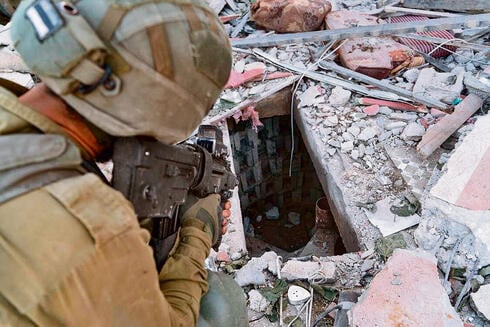A post-war commission of inquiry in Israel should delve into the reasons behind the IDF’s failure in both intelligence gathering and operational response to the Hamas tunnels in Gaza.
As IDF forces advanced in the northern Gaza Strip, the magnitude of the failure became increasingly apparent.
It appears that the IDF underestimated the scale of the long-standing Hamas tunnel project, financed by Qatari funds and utilizing construction materials deceptively introduced into Gaza under the guise of rebuilding damaged homes.
The elaborate tunnel system, stretching approximately 500 km underground, allows Hamas militants to remain concealed for extended periods. Some tunnels are even spacious enough to accommodate vehicle movement and the rapid deployment of forces without detection.
Critical intelligence regarding this extensive tunnel network was lacking until October 7. The IDF’s claims of significant damage to the terrorist infrastructure and a severe blow to the tunnel system during the “Guardian of the Walls” operation in May 2021 were unfounded.
While only a fraction of the tunnels suffered damage, the Palestinians quickly developed methods to fortify and swiftly restore them.
The failure lies primarily in intelligence, where inadequate information was gathered about the inherent dangers of the Hamas tunnel system.
There is also an operational failure in not preemptively neutralizing the tunnels during their construction, preventing them from becoming an integral part of Hamas’s terrorist network in Gaza.
Obtaining such intelligence requires more than Unit 8200’s eavesdropping; it necessitates Israeli intelligence agents physically descending into the tunnel system for photography, measurement, and data collection to facilitate aerial and ground-based demolition activities.
The IDF and Shin Bet lacked comprehensive intelligence, leading to the absence of suitable operational plans for eliminating the tunnel system in its early stages.
For many years, Israeli governments adopted a containment principle, allowing Hamas to quietly build this extensive tunnel system over the years.
During ongoing fighting, the IDF Engineering Corps is working to gather information about the tunnels in the field, recognizing the need for new tactics in combating this formidable challenge.
Similar to the surprise Egypt presented in the Yom Kippur War of 1973, Hamas shocked Israel with its tunnel project.
Key Hamas military figures, including Yahya Sinwar, Muhammad Def, and Marwan Issa, are reportedly hiding in the tunnels in the Khan Yunis area.
Hamas conceals thousands of terrorists and numerous Israeli hostages in these tunnels.
Some reach depths of about 70 meters, serving as multi-purpose floors, including storage for rockets, drones, and ammunition.
To force Hamas out of the tunnels, the IDF must identify and target weak points such as generators and the electrical systems activating the ventilation system.
While holding captive numerous Hamas terrorists who were part of the underground system, the IDF and Shin Bet should extract vital information to address the tunnel system effectively.
Demolishing the extensive tunnel system will be a time-consuming task, but the IDF must ensure no intact tunnel shaft remains in the occupied territories, conducting thorough and irreparable destruction.




